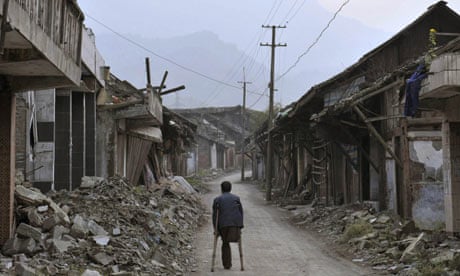Survivors of the Sichuan earthquake face a new threat in the form of pollution from an aluminium plant that has been hailed by the government as a symbol of reconstruction.
Villagers near the factory in Wenchuan county – the area worst hit by the disaster – have told the Guardian their health and crops have been damaged by airborne "white flake" pollution that falls and then covers the soil.
Though more than a year has passed since the quake killed 68,000 people and destroyed millions of homes on 12 May 2008, many residents still live in tents.
The local government has put a priority on rebuilding the economy, partly through the more than five-fold expansion of the Aba Aluminium production line owned by Bosai Corporation – one of Sichuan's biggest exporters. This provides much-needed jobs in the disaster area, but they come at a heavy environmental price, according to nearby residents who complain their harvests have collapsed because of contamination.
"The expansion of the aluminium factory has really affected our lives. I used to grow vegetables and walnuts, but the pollution has ruined the plants and trees," a local woman told the Guardian by telephone. "The powder from the plant floats in the air, and leaves a coating of white sediment on the ground."
To boost the family income, she said her husband took a job in the factory but he had to leave after less than six months because a rash broke out over his body.
Many local residents work in the factory, which pays more than 1,000 yuan (£90) per month – a reasonable income in rural China. But there may be hazards. "We work in bad conditions. The workshops are thick with dust," said an employee. "The pollution became very bad after the expansion. I heard it is because the cleaning devices are not functioning properly."
The employee, whose name like that of the woman is withheld to avoid retribution from local officials, said his 100-tree orchard had failed to yield a harvest this year. Chinese conservationists say the bee population has also been badly affected.
The earthquake struck a day before the upgrade of the aluminium factory was supposed to begin. Local leaders have pushed ahead with the plan as part of the reconstruction effort.
President Hu Jintao and prime minister Wen Jiabao have visited the facility and encouraged the plant's managers to set an example of improved technology standards and efficiency. Falling aluminium prices and continued infrastructure problems have made this difficult.
Local officials and factory executives insist the factory operates according to national standards. "The factory has passed its environmental impact assessment. Once its environment protection equipment operates, emissions will definitely meet standards," said Yang Jian, the head of Wenchuan's environment protection bureau.
He said the bureau has not received any complaints about the factory: "The accusations are not true."
A factory director, who gave only his surname, Cao, said the company has an effective system for emission reduction that was working.
